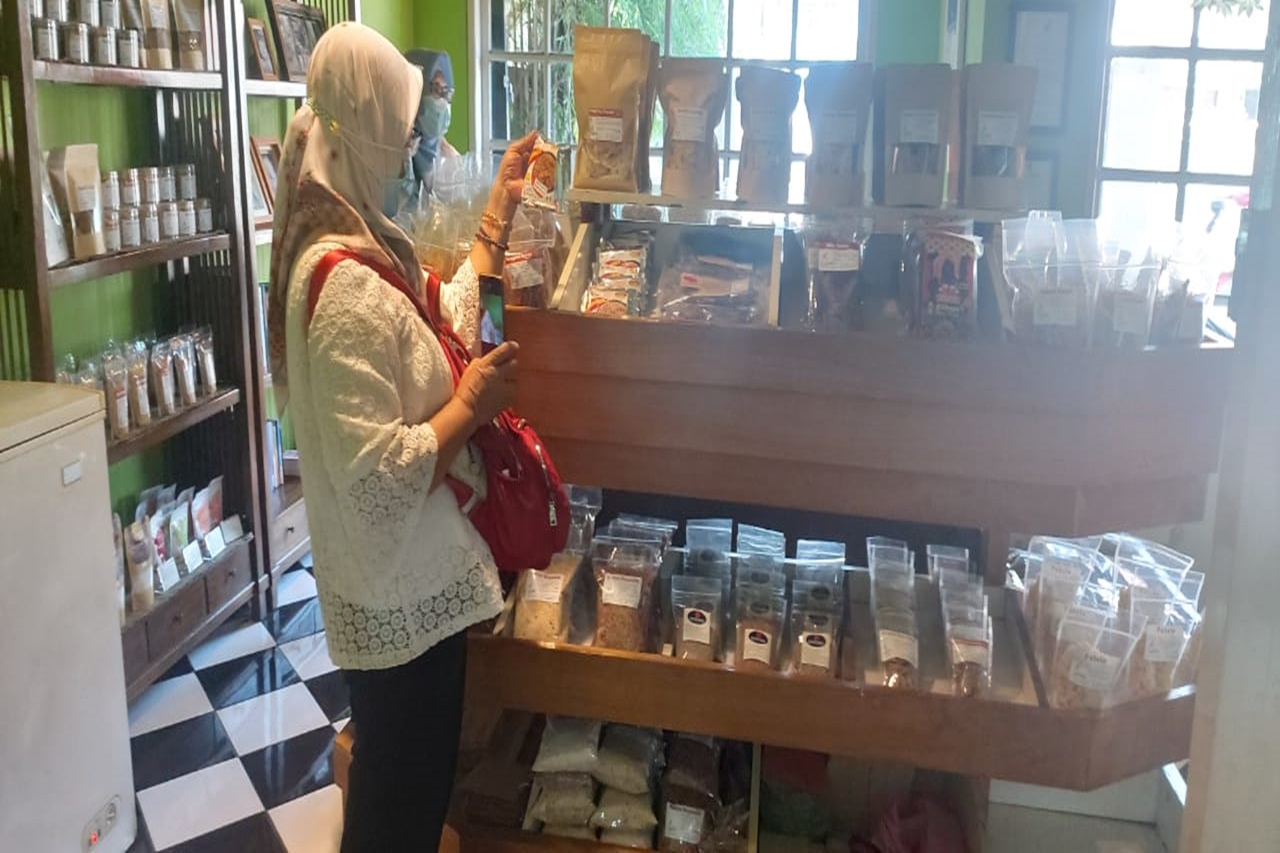BEKASI (March 17, 2021) - Following the direction of the Director General of Social Rehabilitation of the Indonesian Ministry of Social Affairs, Harry Hikmat, the Ciungwanara Disability Center visited a healthy food shop for individuals with special needs in Bekasi named Kainara. This is in line with the plan to build an Occupational Therapeutic Service Center for children with special needs which is part of the ATENSI Creation Center (SKA) at the Ciungwanara Disability Center, Bogor.
During her visit, the Head of the Ciungwanara Disability Center, Bogor, Siti Sari Rumayanti, who was accompanied by a Social Welfare Material and Occupational Therapist, said that this visit was aimed at establishing cooperation in the creation of a Cafe that would provide Autism Friendly Culinary at SKA.
"Based on the direction of the Minister of Social Affairs Tri Rismaharini, in the near future we will create an ATENSI Creation Center at the Ciungwanara Disability Center, Bogor. Our center will become an Occupational Therapeutic Service Center for Children with Special Needs. We hope that Cafe SKA will provide autistic-friendly foods as well," explained Sari opening the visit.
The owner of Kainara, Christien Ismuranty, then told that when he first started this business in 2010 it was because his second child, Kay, who is a person with autism, needed food with a special composition.
"When Kay was diagnosed with autism at the age of 2, I was clearly devastated. As a person with autism, Kay needs extra attention. From a dietary perspective, people with autism must undergo a diet of gluten (a protein in wheat) and casein (a protein in cow's milk). Wheat, wheat flour, cow's milk, cheese, yogurt, sugar, preservatives, and margarine are some of the food ingredients that should be avoided.Consuming foods that contain these ingredients will make children with autism become hyperactive, emotional, difficult to focus, shortness of breath shortness of breath, diarrhea, or trouble sleeping," explains Christine.
During the visit, Christine also invited the Head of the Ciungwanara Disability Center and the team to see the process of making tarts and muffins for people with autism in Kainara's kitchen.
During her visit, the Head of the Ciungwanara Disability Center, Bogor, Siti Sari Rumayanti, who was accompanied by a Social Welfare Material and Occupational Therapist, said that this visit was aimed at establishing cooperation in the creation of a Cafe that would provide Autism Friendly Culinary at SKA.
"Based on the direction of the Minister of Social Affairs Tri Rismaharini, in the near future we will create an ATENSI Creation Center at the Ciungwanara Disability Center, Bogor. Our center will become an Occupational Therapeutic Service Center for Children with Special Needs. We hope that Cafe SKA will provide autistic-friendly foods as well," explained Sari opening the visit.
The owner of Kainara, Christien Ismuranty, then told that when he first started this business in 2010 it was because his second child, Kay, who is a person with autism, needed food with a special composition.
"When Kay was diagnosed with autism at the age of 2, I was clearly devastated. As a person with autism, Kay needs extra attention. From a dietary perspective, people with autism must undergo a diet of gluten (a protein in wheat) and casein (a protein in cow's milk). Wheat, wheat flour, cow's milk, cheese, yogurt, sugar, preservatives, and margarine are some of the food ingredients that should be avoided.Consuming foods that contain these ingredients will make children with autism become hyperactive, emotional, difficult to focus, shortness of breath shortness of breath, diarrhea, or trouble sleeping," explains Christine.
During the visit, Christine also invited the Head of the Ciungwanara Disability Center and the team to see the process of making tarts and muffins for people with autism in Kainara's kitchen.
Christien also explained that all utensils and ingredients in this kitchen must always be sterile from gluten, casein, and others. As a mother with autism, I have to rack my brain to prepare a menu of foods that my child likes and also fulfills their nutritional needs. But the reality is that in society, gluten and casein-free foods are not easily available.
"The existing products are usually imported products that are expensive, even if they are purchased, the child does not necessarily want to eat," said Christine.
At the end of his visit, Sari then asked for Christine's willingness to hold a cooking demo for employees at the Ciungwanara Disability Center, Bogor. Like a tit for tat, Christine also warmly welcomed this cooperation plan and immediately put an agenda for its implementation next week.
She revealed that this collaboration was also an effort to promote services for people with autism, especially for underprivileged families.
"The existing products are usually imported products that are expensive, even if they are purchased, the child does not necessarily want to eat," said Christine.
At the end of his visit, Sari then asked for Christine's willingness to hold a cooking demo for employees at the Ciungwanara Disability Center, Bogor. Like a tit for tat, Christine also warmly welcomed this cooperation plan and immediately put an agenda for its implementation next week.
She revealed that this collaboration was also an effort to promote services for people with autism, especially for underprivileged families.
 Bahasa
Bahasa
 English
English


